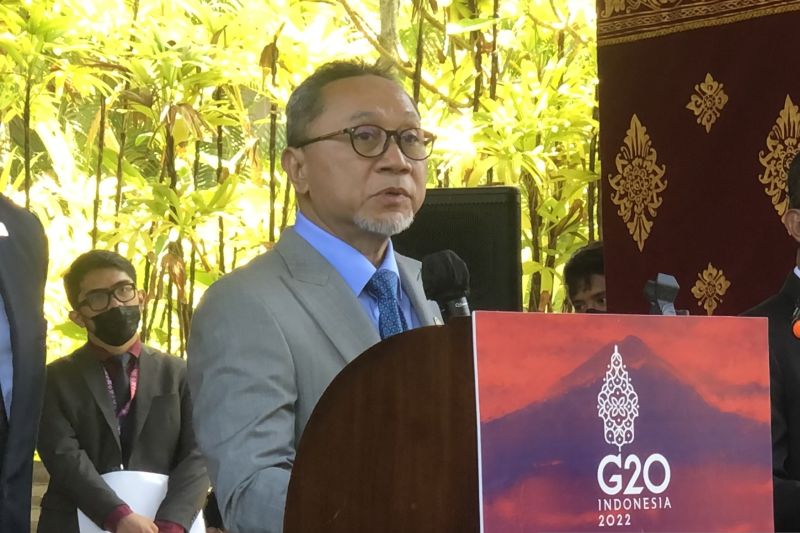
Trade Minister Zulkifli Hasan during a press conference at the G20 Trade Investment and Industry Ministerial Meeting (TIIMM) in Nusa Dua, Bali, Friday. (ANTARA/Sella Panduarsa Gareta/my)
Trade Minister Zulkifli Hasan listed several achievements in the trade sector that were formulated by the G20 Trade, Investment, and Industry Ministerial Meeting (TIIMM).
"First, regarding the reform of the World Trade Organization (WTO), the G20 countries emphasized the importance of improving the basic principles of the WTO and agreed that WTO reform is the key to reinforcing trust in the multilateral trading system," Minister Hasan noted in Nusa Dua, Bali, on Friday.
He said that member countries were also committed to seizing the positive momentum arising from the results of the 12th ministerial conference last year to engage in active and constructive discussions towards the next iteration.
Secondly, the role of the multilateral trading system in improving the agenda of sustainable development targets, in which the G20 members agree on the importance of the multilateral trading system in encouraging the achievement of sustainable development goals or SDGs.
Third, the response to trade, investment, and industry in overcoming the pandemic and supporting the global health architecture, that being G20 countries agreeing on the importance of the multilateral trading system in increasing defense against pandemics and the global health architecture, and also supported the results achieved at the 12th WTO Ministerial Conference.
"Fourth, digital trade and global value chains. G20 member countries stressed that global value chains play an important role in encouraging the participation of developing countries --especially women MSMEs and young entrepreneurs -- in global trade. The G20 also agreed to promote inclusive digital trade," he added.
Fifth, increase sustainable investment for global economic recovery that was emphasized by the G20 countries.
Finally, coherence between trade, investment, and industry, in which the G20 members emphasized the role of the multilateral trading system to restore industrial productivity as well as agreeing upon the coherence of trade and investment policies with industrial policies to address future challenges.
Indonesia conducted bilateral meetings with 13 partner countries -- Australia, South Africa, the United States, Saudi Arabia, India, the United Kingdom, Canada, South Korea, New Zealand, Singapore, Spain, the United Arab Emirates, and the European Union -- on the sidelines of the G20 series.
Indonesia also hosted a meeting with an international organization, the United Nations Economic and Social Commission for Asia and the Pacific.
Contracts were forged between Indonesian business actors and the aforementioned countries in a bid to boost Indonesia's trade relations with partner countries.
"This effort is a tangible form of utilization of concessions owned by Indonesia with partner countries as well as a showcase for all stakeholders to be able to optimize the economic benefits and bilateral trade agreements that Indonesia has," he remarked.
Some 23 trade contracts, valued at almost US$1 billion, were created on the sidelines of the event.
"One of the things that we take pride in is the cooperation contract for the development of human resources in the IT sector that will be used for services trade, in this case, between Australian and Indonesian business players within the Indonesia-Australia Comprehensive Economic Partnership Agreement," Hasan concluded.
Related news: G20: Indonesia explores cooperation opportunities with South Africa
Related news: Minister Hasan seeks support for accelerating GSP authorization
Related news: Minister lays emphasis on industrial digital transformation at TIIMM
"First, regarding the reform of the World Trade Organization (WTO), the G20 countries emphasized the importance of improving the basic principles of the WTO and agreed that WTO reform is the key to reinforcing trust in the multilateral trading system," Minister Hasan noted in Nusa Dua, Bali, on Friday.
He said that member countries were also committed to seizing the positive momentum arising from the results of the 12th ministerial conference last year to engage in active and constructive discussions towards the next iteration.
Secondly, the role of the multilateral trading system in improving the agenda of sustainable development targets, in which the G20 members agree on the importance of the multilateral trading system in encouraging the achievement of sustainable development goals or SDGs.
Third, the response to trade, investment, and industry in overcoming the pandemic and supporting the global health architecture, that being G20 countries agreeing on the importance of the multilateral trading system in increasing defense against pandemics and the global health architecture, and also supported the results achieved at the 12th WTO Ministerial Conference.
"Fourth, digital trade and global value chains. G20 member countries stressed that global value chains play an important role in encouraging the participation of developing countries --especially women MSMEs and young entrepreneurs -- in global trade. The G20 also agreed to promote inclusive digital trade," he added.
Fifth, increase sustainable investment for global economic recovery that was emphasized by the G20 countries.
Finally, coherence between trade, investment, and industry, in which the G20 members emphasized the role of the multilateral trading system to restore industrial productivity as well as agreeing upon the coherence of trade and investment policies with industrial policies to address future challenges.
Indonesia conducted bilateral meetings with 13 partner countries -- Australia, South Africa, the United States, Saudi Arabia, India, the United Kingdom, Canada, South Korea, New Zealand, Singapore, Spain, the United Arab Emirates, and the European Union -- on the sidelines of the G20 series.
Indonesia also hosted a meeting with an international organization, the United Nations Economic and Social Commission for Asia and the Pacific.
Contracts were forged between Indonesian business actors and the aforementioned countries in a bid to boost Indonesia's trade relations with partner countries.
"This effort is a tangible form of utilization of concessions owned by Indonesia with partner countries as well as a showcase for all stakeholders to be able to optimize the economic benefits and bilateral trade agreements that Indonesia has," he remarked.
Some 23 trade contracts, valued at almost US$1 billion, were created on the sidelines of the event.
"One of the things that we take pride in is the cooperation contract for the development of human resources in the IT sector that will be used for services trade, in this case, between Australian and Indonesian business players within the Indonesia-Australia Comprehensive Economic Partnership Agreement," Hasan concluded.
Related news: G20: Indonesia explores cooperation opportunities with South Africa
Related news: Minister Hasan seeks support for accelerating GSP authorization
Related news: Minister lays emphasis on industrial digital transformation at TIIMM


















